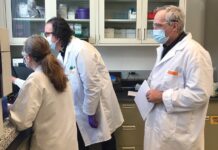PROVIDENCE – The U.S. Department of Defense has awarded Brown University researcher and biology professor Mark Zervas a three-year $935,000 award through the department’s Congressionally Directed Medical Research Program to expand on his research into a type of cell mutation called mosaicism.
Mosaicism refers to a patchwork of healthy and genetically mutated cells alongside one another in the brain, resulting in diseases such as autism, tuberous sclerosis complex and Rett Syndrome.
Last year, Zervas and his team proved they were able to induce mosaicism at specific times during the development of the brain in a rodent model, possibly leading to new information about when a mutation during development may lead to disease.
With the $935,000 from the Department of Defense, Zervas will develop a technique to induce mosaicism in a cell in developing tissue with precise control of timing and scope.
“Essentially we can induce the mutation in a single blastomere and follow the progeny of this mutant cell (its lineage) and directly compare across tissues, brain regions and cell types,” said Zervas.
Zervas has served as the Brown University Manning Assistant Professor of Biology since 2006, and is currently the principal investigator or project leader on three federally funded research initiatives aimed at studying neurons and genetic mutation.
No posts to display
Sign in
Welcome! Log into your account
Forgot your password? Get help
Privacy Policy
Password recovery
Recover your password
A password will be e-mailed to you.











